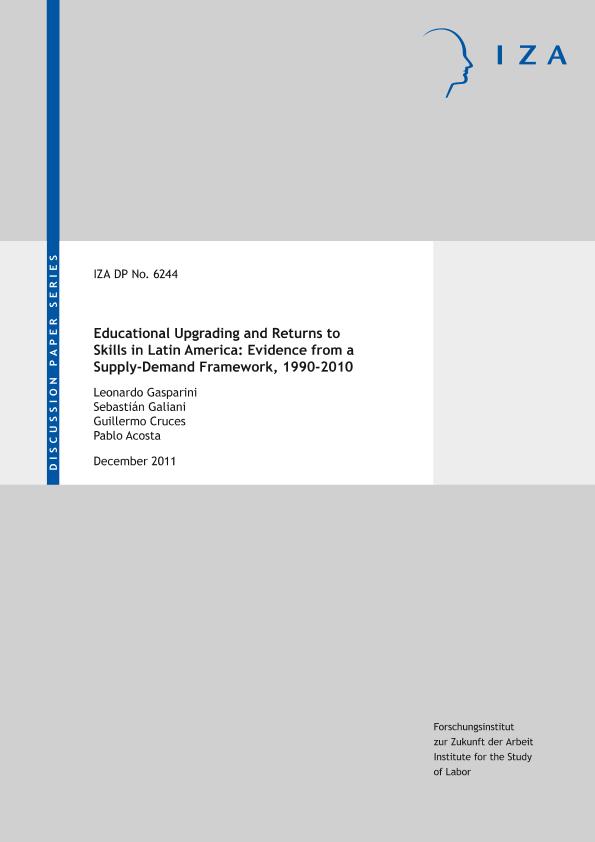Mostrar el registro sencillo del ítem
dc.contributor.author
Gasparini, Leonardo Carlos

dc.contributor.author
Galiani, Sebastián
dc.contributor.author
Cruces, Guillermo Antonio

dc.contributor.author
Acosta, Pablo A.
dc.date.available
2020-03-30T17:47:13Z
dc.date.issued
2011-12
dc.identifier.citation
Gasparini, Leonardo Carlos; Galiani, Sebastián; Cruces, Guillermo Antonio; Acosta, Pablo A.; Educational Upgrading and Returns to Skills in Latin America: Evidence from a Supply-Demand Framework, 1990-2010; IZA - Institute of Labor Economics; IZA Working Paper Series; 6244; 12-2011; 1-54
dc.identifier.issn
0317-8471
dc.identifier.uri
http://hdl.handle.net/11336/101383
dc.description.abstract
It has been argued that a factor behind the decline in income inequality in Latin America in the 2000s was the educational upgrading of its labor force. Between 1990 and 2010, the proportion of the labor force in the region with at least secondary education increased from 40 to 60 percent. Concurrently, returns to secondary education completion fell throughout the past two decades, while the 2000s saw a reversal in the increase in the returns to tertiary education experienced in the 1990s. This paper studies the evolution of wage differentials and the trends in the supply of workers by educational level for 16 Latin American countries between 1990 and 2000. The analysis estimates the relative contribution of supply and demand factors behind recent trends in skill premia for tertiary and secondary educated workers. Supply-side factors seem to have limited explanatory power relative to demand-side factors, and are only relevant to explain part of the fall in wage premia for high-school graduates. Although there is significant heterogeneity in individual country experiences, on average the trend reversal in labor demand in the 2000s can be partially attributed to the recent boom in commodity prices that could favor the unskilled (non-tertiary educated) workforce, although employment patterns by sector suggest that other within-sector forces are also at play, such as technological diffusion or skill mismatches that may reduce the labor productivity of highly-educated workers.
dc.format
application/pdf
dc.language.iso
eng
dc.publisher
IZA - Institute of Labor Economics
dc.rights
info:eu-repo/semantics/openAccess
dc.rights.uri
https://creativecommons.org/licenses/by-nc-sa/2.5/ar/
dc.subject
Skill Premia
dc.subject
Supply And Demand of Labor
dc.subject
Income Inequality
dc.subject
Latin America
dc.subject.classification
Economía, Econometría

dc.subject.classification
Economía y Negocios

dc.subject.classification
CIENCIAS SOCIALES

dc.title
Educational Upgrading and Returns to Skills in Latin America: Evidence from a Supply-Demand Framework, 1990-2010
dc.type
info:eu-repo/semantics/article
dc.type
info:ar-repo/semantics/artículo
dc.type
info:eu-repo/semantics/publishedVersion
dc.date.updated
2019-06-14T18:35:30Z
dc.journal.number
6244
dc.journal.pagination
1-54
dc.journal.pais
Alemania

dc.journal.ciudad
Bonn
dc.description.fil
Fil: Gasparini, Leonardo Carlos. Universidad Nacional de La Plata. Facultad de Ciencias Económicas. Departamento de Ciencias Económicas. Centro de Estudios Distributivos Laborales y Sociales; Argentina. Consejo Nacional de Investigaciones Científicas y Técnicas; Argentina
dc.description.fil
Fil: Galiani, Sebastián. Washington University in St. Louis; Estados Unidos
dc.description.fil
Fil: Cruces, Guillermo Antonio. Universidad Nacional de La Plata. Facultad de Ciencias Económicas. Departamento de Ciencias Económicas. Centro de Estudios Distributivos Laborales y Sociales; Argentina. Consejo Nacional de Investigaciones Científicas y Técnicas; Argentina
dc.description.fil
Fil: Acosta, Pablo A.. World Bank; Estados Unidos
dc.journal.title
IZA Working Paper Series
dc.relation.alternativeid
info:eu-repo/semantics/altIdentifier/url/http://www.iza.org/en/webcontent/publications/papers/viewAbstract?dp_id=6244
Archivos asociados
